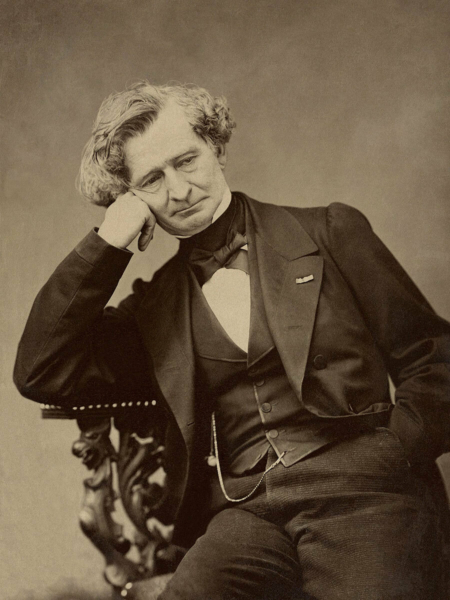Hector Berlioz (1803–1869)
Anerkennung erhielt er für seine Kompositionen in Deutschland, Russland und Österreich, in Frankreich blieb sie ihm lange verwehrt.
Der französische Komponist studierte unter anderem bei Le Sueur und Reicha am Conservatoire de Paris. 1830 erhielt er dort den Prix de Rome, mit dem ein zweijähriger Aufenthalt in Italien verbunden war. Berlioz beschäftigte sich früh mit den Opern Glucks und Spontinis, später dann eingehend mit den Symphonien Beethovens.
Mit der Uraufführung seiner Symphonie fantastique 1830 gelang es ihm, das französische Publikum für seine Musik zumindest zu erwärmen. Das Werk, von Berlioz selbst als „musikalisches Drama“ bezeichnet, beeinflusst die Entwicklung der Symphonischen Dichtung. Anerkennung erhielt Berlioz für seine Kompositionen in Deutschland, Russland und Österreich, großes Ansehen in Frankreich blieb ihm lange verwehrt. Finanzielle Gründe nötigten ihn, neben seiner Arbeit als Komponist und Dirigent, als Musikkritiker unter anderem für das „Journal des débats“ zu schreiben.
Neben zahlreichen Opern und Orchesterwerken verfasste Berlioz 1844 den „Grand Traité d'instrumentation et d'orchestration moderne“, die erste umfangreiche Instrumentationslehre.
Wie groß Berlioz' internationale Bedeutung nach seinem Tode war, zeigt die Tatsache, dass Breitkopf & Härtel 1900 eine Gesamtausgabe mit dreisprachigen Gesangstexten (u. a. mit La Damnation de Faust, L'Enfance du Christ und Roméo et Juliette) unternahm.









